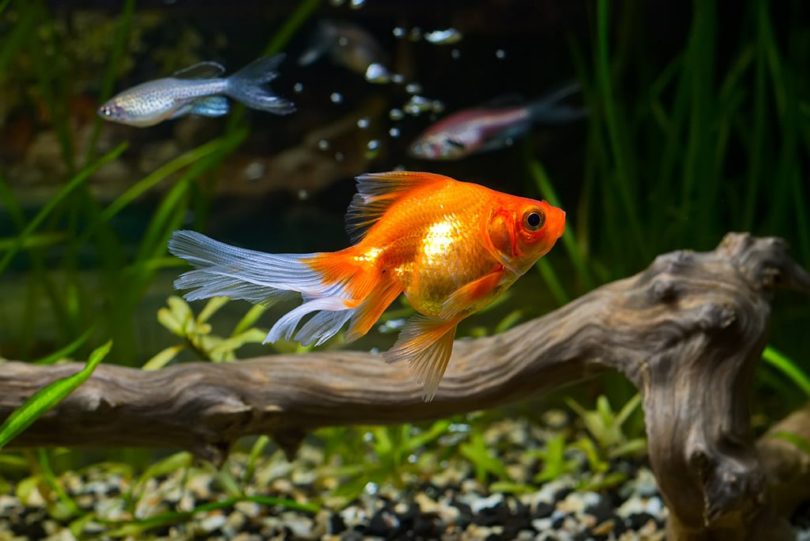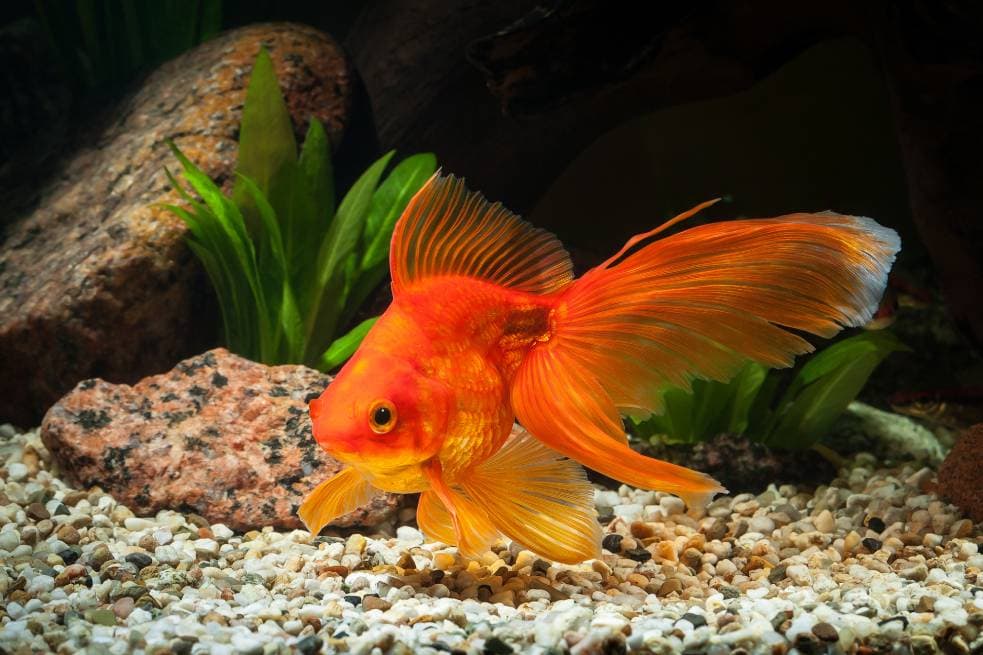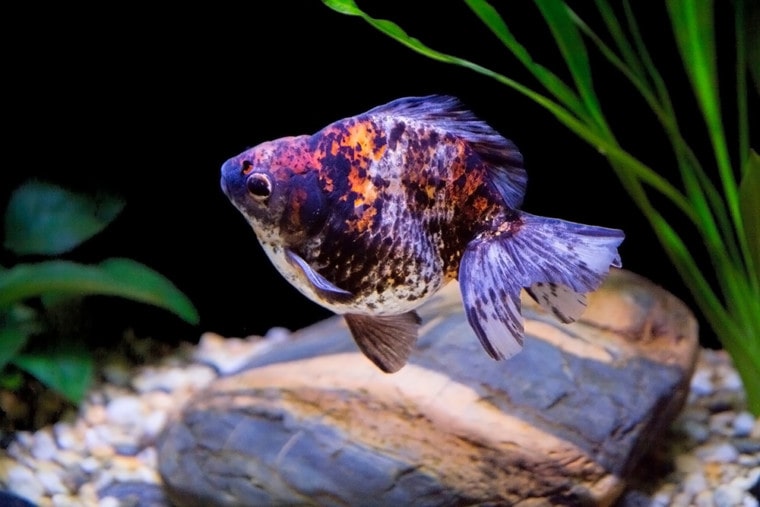
Yes, goldfish do sleep, but not in the same way that humans do. Goldfish do not have eyelids and therefore do not close their eyes to fall asleep. Sleeping is an important aspect of a healthy goldfish, and they should sleep throughout the night.
Goldfish get tired just like humans do and enjoy a good night’s rest. Goldfish can only sleep when the surrounding area is dark, and no lights are on over the tank or throughout the environment. This makes it important to ensure that you give your goldfish a period of darkness for several hours a day. This can be made easy by providing them with darkness at the same time you go to bed.
How Do Goldfish Sleep?
Goldfish do not have a dedicated bed to sleep in, nor do they lie down when sleeping. Instead, goldfish become inactive and will hover in one area of the tank. Their fins will move to keep them stable in a certain position, and their gills will move. A goldfish may decide to sleep near the surface, under a decoration, or even low on the ground. Their head will hang lower than the body.
Although the term “sleep” is used to describe the state of rest goldfish go into at night, a goldfish’s brainwaves do not change as they sleep, and they are unable to enter REM (rapid eye movement) as people do in a deep sleep. Goldfish are conscious when they are sleeping and will still move their eyes or body when you approach the tank. This is to detect predators that may disturb them at night. Goldfish will usually form a loose group when they sleep, and each goldfish will be on alert while resting.
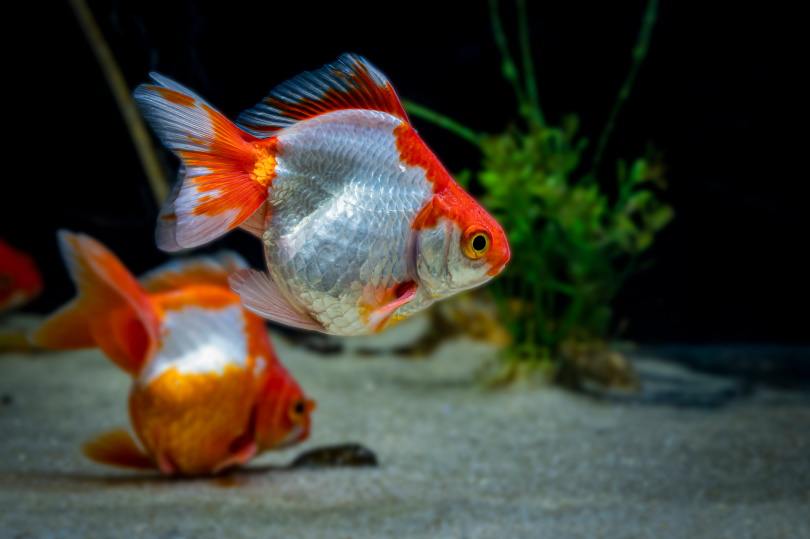
When Do Goldfish Sleep?
Goldfish will start to prepare to sleep as the tank falls into darkness and the environment falls quiet, which is generally at night. In the wild, a goldfish has a metaphorical internal clock, and darkness accompanied by moon rays and decreased temperature will automatically inform them that it is time to sleep. As a pet, your goldfish will need to have complete darkness and minimal noise to sleep properly. Goldfish should ideally sleep when you sleep; this way you can enjoy their activity when you are awake. However, changing around a goldfish’s sleep cycle may interfere with their biological clock.
If you're new to the world of goldfish keeping or are experienced but love to learn more, we highly recommend you check out the best-selling book, The Truth About Goldfish, on Amazon. From diagnosing illnesses and providing correct treatments to proper nutrition, tank maintenance and water quality advice, this book will help you to ensure your goldfish are happy and to be the best goldfish keeper you can be.
Providing Your Goldfish with a Day and Night Cycle
If you turn the lights off at the same time each night, your goldfish will fall into a structured sleeping schedule. This is the best way to ensure that your goldfish is sleeping for enough hours.
Most aquarium lights come with timers that are set on the remote control. This is helpful for keepers that are busy and may forget to switch the tank’s light on and off. Most automatic lights will also come with a dawn and dusk option, which is a great way to expose your goldfish to natural periods of light.
If the light does not come with a dimming option, you want to generally switch the light off while there is still visible light in the surrounding area. Alternating your goldfish’s environment from bright light to darkness will startle them and they may have trouble resting for the next few hours.
Signs of Sleep Deprivation in Goldfish
If your goldfish do not receive enough hours to get healthy sleep, you may find them showing signs of sleep deprivation and increased levels of stress. Just like humans, goldfish need to sleep to restore their energy and maintain a normal immune function. Goldfish need at least 8 to 12 hours of complete darkness to sleep, and anything less will start to show negative effects on their health over time.
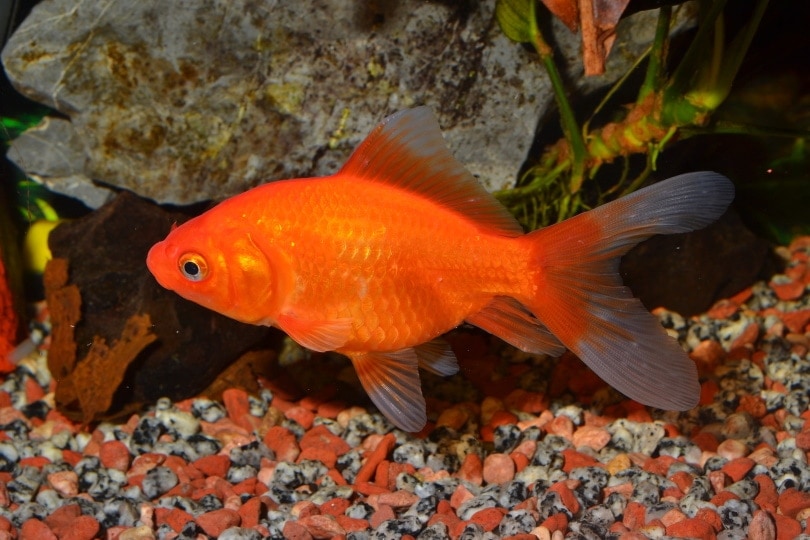
Goldfish Bottom-sitting or Sleeping?
Many people assume that their goldfish is sleeping if they are bottom-sitting. Both may seem the same but have different meanings.
Goldfish bottom-sit because they are either ill, stressed, suffering from small tank syndrome, or the water conditions are poor. Bottom-sitting is typically accompanied by tightly clamped fins and lethargy. To determine the cause of the problem, you will have to do water tests and check for signs of illness. If the goldfish cannot swim six times its body length across the tank, then the tank may be too small.
Goldfish will not sleep in the day when there is light in the surrounding area, and if they are bottom-sitting throughout the day, there are other issues present that are stressing your goldfish put. Some goldfish will sleep on the bottom of the tank, but they will only do this at night and display loosely down-turned fins.
Decrease in Temperature
A decrease in the environmental temperature will stimulate your goldfish to sleep for longer. This is because wintertime has shorter hours in the day. Your goldfish may naturally want to sleep earlier if their water is kept below average for extended periods. Lower temperature can also cause them to become less active, which can mimic how they would sleep.

Goldfish Bodily Functions During Sleep
Goldfish can still pass waste and sense environmental changes when they are asleep. Their lateral line will pick up most movements and stimulants in the environment as their eyesight is poor in darkness.
During sleep time, their senses will be heightened and even the slightest noise or movement will wake them up. Goldfish are cautious when they sleep and react to their owners looking through the tank. This makes it hard to catch your goldfish sleeping because they know you are watching them.
Since a goldfish’s metabolism slows down while they sleep, they should not be fed a few hours before nightfall. This gives them time to digest their previous meal.
A goldfish’s color will dull at night when they are sleeping to blend into the decorations. This is helpful in the wild because it prevents them from standing out in the darkness. Your goldfish’s vibrant colors should return when it is morning.
Final Thoughts
Sleeping is an interesting aspect to goldfish owners and equally beneficial. You should make it a priority to switch off the light on your goldfish’s tank at night so that the goldfish does not struggle to sleep. Sleeping plays an important role in a goldfish’s daily cycle and you should try to mimic the amount of light and darkness they experience in the wild.
See also:
Featured Image Credit: Galina Savina, Shutterstock





